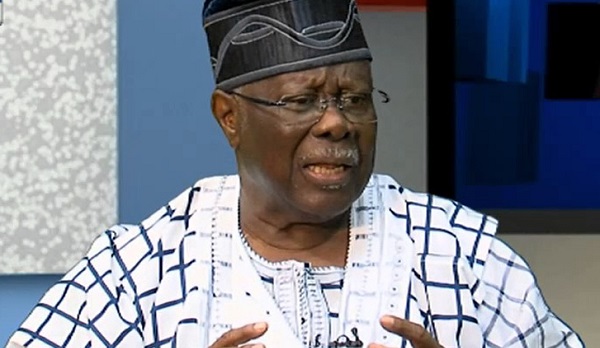Former Peoples Democratic Party (PDP) chieftain Bode George has launched a scathing critique of President Bola Tinubu’s recent media appearance, characterizing the President’s stance on economic reforms as disconnected from the harsh realities facing ordinary Nigerians. The elder statesman’s rebuke comes amid growing public discontent over soaring living costs and recent food queue tragedies that claimed 67 lives.
Speaking on Channels Television’s Politics Today program, George condemned what he perceived as a lack of empathy in the President’s Monday media chat, particularly given the current climate of widespread hardship. There is hunger and anger in the land,” George emphasized, pointing to the stark contrast between the administration’s claims of successful reforms and the deteriorating economic conditions experienced by many citizens.
The timing of George’s criticism carries particular weight, coming on the heels of three deadly stampedes at food distribution centers last week. These tragic incidents have become powerful symbols of the nation’s mounting economic crisis, throwing into sharp relief the gap between government policy and ground-level realities. Hunger doesn’t believe in your talk, you gotta be real,” George stated, challenging the administration’s positive assessment of its economic reforms.
At the heart of the controversy lies the government’s subsidy removal policy, implemented in May 2023, which has triggered a cascade of economic challenges. Fuel prices have skyrocketed from approximately N200 per liter to over N1,000, creating ripple effects throughout the economy. This situation is particularly challenging in a nation heavily dependent on imported refined petroleum products, with non-operational state-owned refineries compounding the problem.
The economic landscape has been further complicated by the government’s forex window unification policy, which has seen the naira’s value plummet dramatically against the dollar, from N700 to over N1,600 at the parallel market. This currency devaluation has contributed to steep increases in food prices and basic commodities, intensifying the hardship faced by ordinary citizens.
Despite mounting criticism and calls for policy reconsideration, President Tinubu maintained his stance during Monday’s media chat, expressing no regrets about the subsidy removal. He defended his position by arguing that Nigeria cannot continue to function as “Father Christmas to neighbouring countries,” a statement that has drawn mixed reactions from various quarters.
The PDP Board of Trustees member particularly took issue with the tone and timing of the President’s media appearance, suggesting it was an inappropriate way to conclude the year given the current national mood. George’s criticism extended beyond mere disagreement with policies to question the fundamental approach to governance, calling for immediate palliative measures to address the growing hunger crisis.
The current situation highlights a broader debate about the balance between necessary economic reforms and their immediate impact on the population. While the administration maintains that these measures are essential for long-term economic stability, critics like George argue that the human cost is too high and immediate relief measures are necessary.
Nigeria’s position as Africa’s most populous nation adds another layer of complexity to the situation, with the challenges of managing economic reforms magnified by the sheer scale of the population affected. The ongoing energy challenges, characterized by persistent fuel queues and epileptic electricity supply, have become emblematic of the broader struggles facing the nation.
As the year draws to a close, the controversy surrounding Tinubu’s economic policies and their implementation continues to intensify, with no clear resolution in sight. The debate underscores the complex challenges facing Nigeria’s leadership as it attempts to balance necessary economic reforms with the immediate needs of its citizens, all while managing growing public discontent and calls for policy adjustments.



